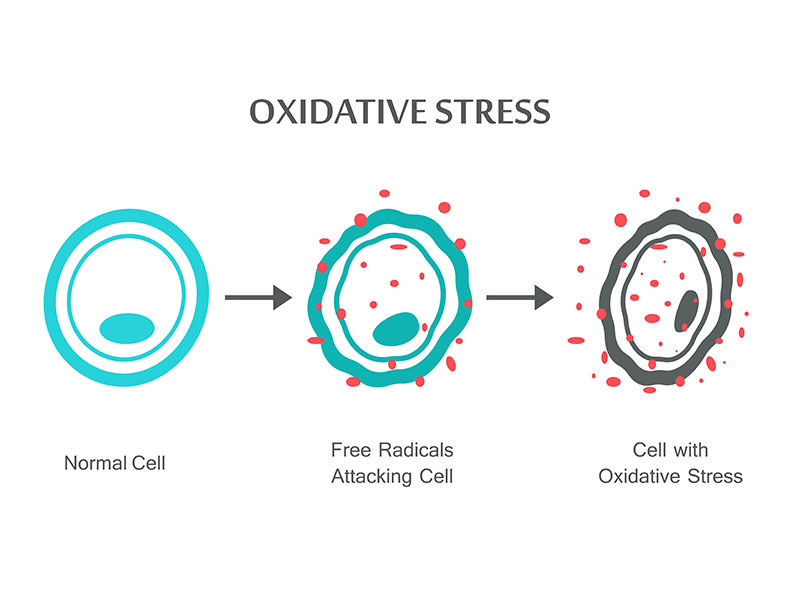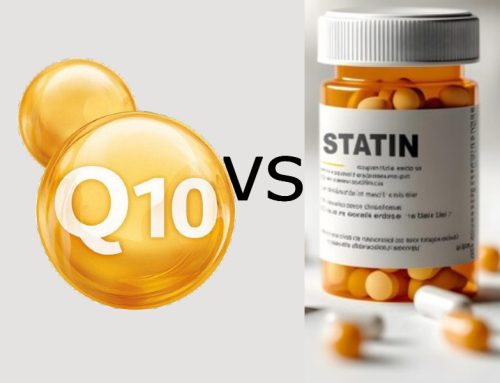Combined daily Coenzyme Q10 and selenium supplementation reduces the levels of systemic oxidative stress in the body.

A 2023 sub-analysis of the KiSel-10 Study data shows that Coenzyme Q10 and selenium supplementation reduces systemic oxidative stress and reduces cardiovascular disease mortality in elderly individuals. Shown here: Professor Urban Alehagen, lead researcher.
Oxidative stress occurs whenever harmful free radicals achieve an overbalance with respect to the antioxidants that protect against oxidative damage. Oxidative stress leads to the disruption of intracellular redox signaling and to molecular damage of DNA, proteins, and lipids [Dunning & Alehagen 2023].
The concentration level of circulating free thiols in serum is a recognized biomarker of intracellular oxidative stress [Dunning & Alehagen 2023]:
- Harmful free radicals oxidize free thiols without much difficulty.
- Consequently, lower levels of free thiols in the blood circulation are a sign of systemic oxidative stress.
- Lower serum free thiol levels are associated with significantly increased risk of adverse cardiovascular disease events and all-cause mortality.
- Higher levels of serum free thiol concentrations are associated with lower risk of heart failure and with favorable disease outcome.
- CoQ10 and selenium supplementation are a therapeutic means to modulate the oxidative status of free thiols and to reduce systemic oxidative stress.
Note: Thiols are sulfur-containing organic compounds with the formula R-SH where R stands for any hydrocarbon group.
Coenzyme Q10 and Selenium Reduce Systemic Oxidative Stress
After 48 months of daily combined supplementation with selenium and Coenzyme Q10 in the KiSel-10 study, elderly study participants in the active treatment group showed significantly increased levels of serum free thiols compared to placebo. The Ki-Sel-10 researchers concluded that combined supplementation with selenium and Coenzyme Q10 of elderly community-dwelling individuals with low status of both substances significantly improved serum free thiol levels and effectively reduced systemic oxidative stress [Dunning & Alehagen 2023].
Higher Free Thiol Levels Associated with Reduced Risk of Death from Heart Disease
In a second focus of the study, the KiSel-10 study researchers investigated baseline levels of free thiols, a biomarker for systemic oxidative stress, were associated with cardiovascular disease-associated mortality.
They included 434 study participants in the analysis: 218 individuals in the active treatment group and 216 in the placebo group. The mean age of all the study participants was 77 years. Males and females were almost equally represented (50.6% vs. 49.4%) [Dunning & Alehagen 2023].
Following a median follow-up of 10.0 years, the researchers found that 128 participants had died because of a cardiovascular event. They observed that the highest rate of cardiovascular disease-associated mortality occurred in the lowest quartile of free thiol concentrations at baseline – 40%.
After doing an adjustment for age, sex, diabetes, hypertension, ischemic heart disease, and atrial fibrillation, the researchers continued to see a statistically significant associated between the concentration of free thiols in the blood and the risk of death from cardiovascular disease – the lower the free thiol levels, the higher the risk [Dunning & Alehagen 2023].
Conclusion: CoQ10/Selenium Supplementation Reduces Systemic Oxidative Stress
- Supplementation with a combination of Coenzyme Q10 and selenium significantly increases serum free thiol levels in elderly individuals with low selenium and CoQ10 status [Dunning & Alehagen 2023].
- This is important because lower serum free thiol levels are significantly associated with a greater risk of adverse cardiovascular disease events and all-cause mortality [Abdulle 2020].
- Supplementation with Coenzyme Q10 and selenium is an appropriate therapy for the increasing serum free thiol concentrations, reducing systemic oxidative stress, and reducing the risk of adverse cardiovascular disease events [Dunning & Alehagen 2023].
- CoQ10 therapy is safe, effective, and affordable; however, the wise consumer will always want a CoQ10 product with documented absorption and bio-availability [Mantle & Dybring 2020].
Sources
Abdulle AE, Bourgonje AR, Kieneker LM, Koning AM, la Bastide-van Gemert S, Bulthuis MLC, Dijkstra G, Faber KN, Dullaart RPF, Bakker SJL, Gans ROB, Gansevoort RT, Mulder DJ, Pasch A, van Goor H. Serum free thiols predict cardiovascular events and all-cause mortality in the general population: a prospective cohort study. BMC Med. 2020 May 27;18(1):130.
Dunning BJ, Bourgonje AR, Bulthuis ML, Alexander J, Aaseth JO, Larsson A, van Goor H, Alehagen U. Selenium and coenzyme Q10 improve the systemic redox status while reducing cardiovascular mortality in elderly population-based individuals. Free Radical Biology and Medicine. 2023;204:207-214.
Mantle D, Dybring A. Bioavailability of Coenzyme Q10: An overview of the absorption process and subsequent metabolism. Antioxidants (Basel). 2020 May 5;9(5):386.
The information presented in this review article is not intended as medical advice and should not be used as such.








Thanks, I take a bunch of different vitamins and I like to also CoQ10 and selenium but don’t know if I over taking to much at the same time. Please I like advice from you. Because everytime I ask my doctor he never give me any advice. Again thanks,
Dear Doel –
Please remember. I am not a medical doctor. I do not give medical advice.
The main thing is to ask your doctor to have your serum selenium concentration tested. Too little selenium is not good, and too much selenium is not good, so it is important to know what your present level is. Right now, the research papers I read indicate the a serum selenium concentration of about 125 micrograms per liter is an optimal level. Bomer et al have shown that serum selenium levels under 100 micrograms per liter are associated with more signs and symptoms of heart failure and with lower exercise capacity and with lower quality of life.
Then, check to see if you are already getting some selenium in your multi-vitamin.
The Coenzyme Q10 is more straightforward. If you are above the age of 40 years, you are entering the age range in which your body’s synthesis of Coenzyme Q10 is declining. The important thing is to take the Coenzyme Q10 supplements with meals containing a little fat (to help absorption) and to take one capsule at breakfast and one capsule at lunch. You want to find a CoQ10 supplement for which you can find documentation of its absorbability and its bioavailability.
Best wishes.
Richard